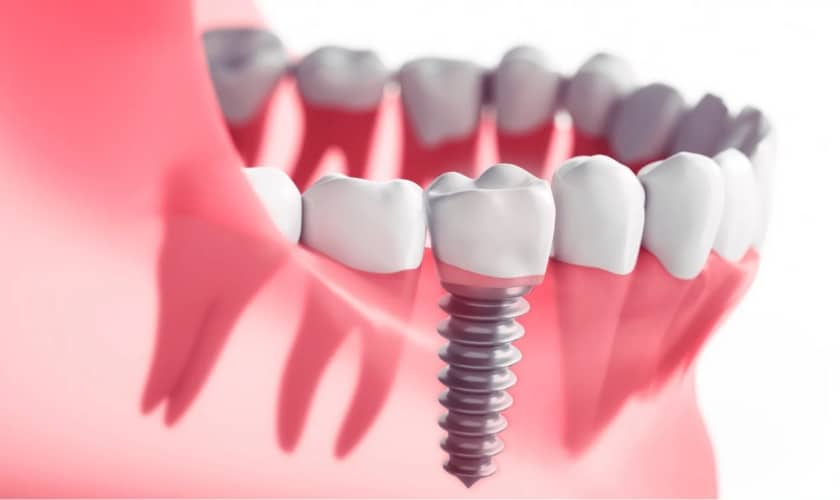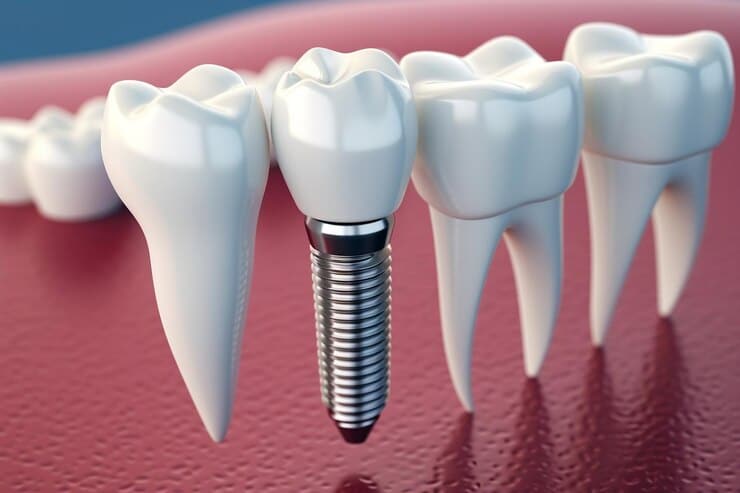
Losing a tooth can be a disheartening experience, affecting not only your self-esteem but also your overall oral health. However, implants offer a transformative solution to this common problem. Dental implants are more than just replacements; they are permanent, functional, and natural-looking teeth that seamlessly restore your smile and chewing abilities.
Unlike traditional alternatives like dentures or bridges, dental implants provide a long-lasting and stable solution that prevents bone loss, maintaining your facial structure. This comprehensive treatment involves surgically placing a titanium post into your jawbone, which eventually fuses, creating a robust foundation for a custom-made prosthetic tooth.
Dental implants have become the go-to choice for individuals seeking a reliable and aesthetic remedy for missing teeth. Discover the art and science behind dental implantology and regain your confident, radiant smile today.
Understanding Dental Implants
A. What Are Dental Implants?
Dental implants are a cutting-edge solution for replacing missing teeth. These artificial tooth roots are typically made of titanium, a biocompatible material that fuses with the jawbone in a process called osseointegration. This fusion creates a solid foundation for attaching a prosthetic tooth, allowing it to function and appear like a natural tooth.
B. Components of Dental Implants
Dental implants consist of three main components:
- Implant: The implant itself is a small, screw-like post that is surgically inserted into the jawbone. This serves as the root of the artificial tooth and plays a crucial role in stability and osseointegration.
- Abutment: The abutment connects the implant to the prosthetic tooth. It acts as a connector that extends above the gumline, providing a secure attachment point for the crown.
- Crown: The crown is the visible part of the dental implant, custom-designed to match the color, shape, and size of your natural teeth. It is attached to the abutment, resulting in a functional and aesthetically pleasing replacement for the missing tooth.
C. Durability and Permanence of Dental Implants
One of the most significant advantages of dental implants is their long-term durability and permanence.
- Longevity: Dental implants are designed to last for many years, often a lifetime, with proper care and maintenance. They are highly resistant to decay and other oral health issues that can affect natural teeth.
- Stability: Once the implant integrates with the jawbone, it becomes a stable and solid anchor for the prosthetic tooth. This stability allows for normal chewing and biting without the worry of slippage.
- Natural Feel: Dental implants mimic the look, feel, and function of natural teeth. Their permanence means you can enjoy a full and confident smile, without the need for ongoing replacements or adjustments.
The Benefits of Dental Implants
A. Aesthetic Advantages of Dental Implants
Dental implants offer a range of aesthetic benefits that make them a popular choice for individuals seeking to restore their smiles:
- Natural Appearance: Dental implants closely resemble natural teeth in terms of shape, color, and size. Their customized crowns are designed to blend seamlessly with your existing teeth, ensuring a natural and aesthetically pleasing result.
- Enhanced Smile: Dental implants can improve the appearance of your smile, helping you regain confidence and a sense of self-assurance. Their natural look can make it difficult for others to distinguish them from your real teeth.
B. Prevention of Bone Loss
One of the remarkable advantages of dental implants is their ability to prevent bone loss in the jaw:
- Preservation of Jawbone: When a tooth is lost, the underlying jawbone can start to deteriorate due to lack of stimulation. Dental implants serve as artificial tooth roots, stimulating the jawbone and preventing the bone loss that can lead to facial changes and a sunken appearance.
- Long-Term Oral Health: By maintaining the integrity of the jawbone, dental implants support your overall oral health. They reduce the risk of adjacent teeth shifting and provide stability for your bite, contributing to a healthier mouth.
C. Improved Self-Esteem with Natural Look and Feel
Dental implants don’t just restore your smile; they can have a profound impact on your self-esteem:
- Confidence: With dental implants, you can confidently eat, speak, and smile without worrying about your teeth slipping or shifting. This newfound confidence can have a positive impact on your social and professional life.
- Natural Comfort: Dental implants feel like your natural teeth. There are no discomfort or limitations commonly associated with dentures or bridges. Their stability and natural function make you forget they are artificial.
The Dental Implant Procedure
A. Step-by-Step Process of Getting Dental Implants
The dental implant procedure involves several key steps to ensure a successful outcome:
- Initial Consultation: The process typically begins with a consultation where your dentist evaluates your oral health and discusses your needs and expectations.
- Treatment Planning: A comprehensive treatment plan is developed, including X-rays, 3D imaging, and impressions to determine the implant’s precise location and angulation.
- Implant Placement: In a surgical procedure, the dentist will insert the titanium implant into the jawbone. This implant acts as the artificial tooth root and is left to heal and integrate with the bone, a process known as osseointegration.
- Abutment Placement: Once the implant has integrated with the jawbone, an abutment is attached. This serves as a connector for the prosthetic tooth.
- Custom Crown Placement: A custom-made crown, designed to match the color and shape of your natural teeth, is affixed to the abutment. This crown is the visible part of your new tooth.
- Final Adjustments: The dentist ensures the implant is properly aligned and functions like a natural tooth. Any necessary adjustments are made.
- Healing and Follow-Up: After the procedure, a healing period is required, during which your dentist monitors your progress to ensure proper healing and integration.
B. Importance of Comprehensive Evaluation and Planning
A comprehensive evaluation and planning stage is crucial for the success of dental implant procedures:
- Accurate Assessment: Through detailed evaluation, your dentist can accurately assess your oral health, bone density, and the condition of the surrounding teeth.
- Customization: Planning allows for the customization of the implant procedure to meet your specific needs, ensuring that the implant is positioned correctly and that it will function optimally.
- Risk Management: Thorough planning helps identify and address any potential challenges or complications in advance, reducing the risk of issues during or after the procedure.
- Patient Involvement: It also provides an opportunity for you to actively participate in the decision-making process, understand the treatment, and set realistic expectations.
C. Role of a Skilled Dentist in the Procedure
The success of dental implant procedures largely depends on the expertise of the dentist:
- Expertise and Experience: A skilled dentist has the necessary training and experience to perform implant surgery, ensuring precision and minimizing the risk of complications.
- Customization: They work closely with you to create a tailored treatment plan, taking into account your unique oral health needs and aesthetic preferences.
- Monitoring and Aftercare: Skilled dentists provide post-operative care and closely monitor the healing process, ensuring that any issues are addressed promptly.
- Technology Utilization: They employ advanced dental technology for accurate diagnostics and treatment, improving the overall success and efficiency of the procedure.
Who Can Benefit from Dental Implants?
A. Qualifying Candidates for Dental Implants
Dental implants can benefit a wide range of individuals, and qualifying candidates typically include those who:
- Are Missing Teeth: Candidates who have one or more missing teeth can benefit from dental implants. Implants can replace single teeth, multiple teeth, or even a full arch.
- Have Adequate Bone Density: Sufficient jawbone density is essential for implant stability. Candidates with adequate bone volume are often suitable, but bone augmentation procedures can help those with bone loss become candidates.
- Are in Good Oral Health: Candidates should have a healthy mouth, free of untreated gum disease or significant dental issues. Any existing oral health problems should be addressed before implant placement.
- Are Committed to Oral Hygiene: Candidates must be committed to maintaining good oral hygiene practices to ensure the long-term success of their implants.
- Have Realistic Expectations: Candidates should understand the dental implant process and have realistic expectations regarding the time, effort, and costs involved.
B. Factors Affecting Candidacy
Several factors may affect a person’s candidacy for dental implants:
- Insufficient Bone Density: If a candidate has inadequate bone density, bone grafts or other augmentation procedures may be necessary to create a stable foundation for the implant.
- Medical Conditions: Some medical conditions or medications can impact a person’s ability to heal or increase the risk of complications. Candidates with certain medical conditions may need to be evaluated on a case-by-case basis.
- Smoking: Smoking can negatively affect the success of dental implants. Candidates who smoke may need to quit or reduce smoking for better outcomes.
- Pregnancy: Pregnancy can impact the timing of implant placement, and some dentists may recommend waiting until after pregnancy to reduce potential risks.
- Age: Age itself is not a limiting factor; older individuals can benefit from dental implants. However, overall health and bone density play a more critical role in determining candidacy.
C. Flexibility of Dental Implants for Various Cases
Dental implants offer remarkable flexibility for addressing different cases:
- Single Tooth Replacement: Dental implants can replace a single missing tooth without affecting adjacent teeth, preserving the integrity of the surrounding dental structures.
- Multiple Tooth Replacement: Implants can support dental bridges or even full arches of teeth, providing a stable and permanent solution for individuals missing several teeth.
- Implant-Supported Dentures: For those with complete tooth loss, implant-supported dentures offer a secure and comfortable alternative to traditional dentures.
- All-on-4 or All-on-6: These innovative techniques allow for a full arch of teeth to be supported by just a few strategically placed implants, reducing the need for extensive surgery and recovery time.
- Case-Specific Solutions: Dental implant procedures are highly customizable, and the treatment plan can be tailored to the unique needs and goals of each patient, ensuring a solution that fits their situation.
Finding the Right Dentist in Encino
A. Tips for Choosing a Reputable Dentist for Dental Implant Procedures
When selecting a dentist for dental implant procedures, consider the following tips to ensure you make the right choice:
- Check Qualifications: Verify that the dentist is licensed and has received specialized training in implant dentistry. Look for credentials such as a DDS or DMD degree.
- Experience Matters: Choose a dentist with substantial experience in dental implant procedures. An experienced dentist is more likely to deliver successful outcomes.
- Patient Reviews: Read online reviews and testimonials from previous patients to gauge the dentist’s reputation and patient satisfaction.
- Ask for Referrals: Seek recommendations from friends, family, or your general dentist, as they may be able to suggest experienced implant specialists.
- Consultation: Schedule a consultation to meet the dentist, discuss your needs, and ask questions about the procedure. A reputable dentist should be open to addressing your concerns.
B. Importance of Experience and Credentials
The experience and credentials of a dentist are paramount when considering dental implant procedures:
- Specialized Training: Dentists with specific training in implantology are better equipped to plan and execute implant procedures. Look for evidence of postgraduate courses and certifications.
- Proven Track Record: An experienced dentist should have a portfolio of successful cases and be able to provide before-and-after photos of previous implant patients.
- Continuing Education: The field of dentistry is continually evolving. Dentists who invest in ongoing education and stay updated on the latest techniques and technologies are more likely to deliver high-quality care.
- Board Certification: While not mandatory, board-certified implantologists have undergone rigorous testing and evaluation, indicating their commitment to excellence.
C. Resources or Recommendations for Local Dental Professionals
To help you find reputable dentists in Encino, you can consider the following resources:
- American Academy of Implant Dentistry (AAID): The AAID website has a “Find an Implant Dentist” feature that allows you to search for accredited implant dentists in your area.
- Local Dental Associations: Contact your local or state dental association for referrals to qualified implant specialists.
- Online Directories: Online directories like Healthgrades, Zocdoc, or Yelp often have listings and patient reviews for local dentists.
- Ask for Recommendations: Don’t hesitate to ask your general dentist or friends and family for recommendations based on their experiences.
Dental implants represent a transformative solution for individuals dealing with missing teeth in Encino. They offer numerous benefits, from restoring aesthetics and preventing bone loss to boosting self-esteem and overall oral health. The procedure involves careful evaluation, precise planning, and the expertise of a skilled dentist. Selecting a reputable dentist with the right qualifications and experience is crucial for the success of the implant journey. By following the tips and resources provided, you can make an informed choice. Whether you need a single tooth replaced or a full smile restoration, dental implants offer a versatile and lasting remedy, ultimately improving your quality of life and confidence.



